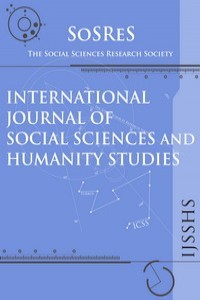POLITICAL CHARACTER OF THE SOCIAL ACTIONS IN THE PROCESS OF GLOBALIZATION: A CASE STUDY
POLITICAL CHARACTER OF THE SOCIAL ACTIONS IN THE PROCESS OF GLOBALIZATION: A CASE STUDY
Social action, globalization political action, ecologic movement,
___
- Balat, Havva (2007), “A renewable perspective for sustainable energy development in Turkey: The case of small hydropower plants”, Renewable and Sustainable Energy Reviews, Vol.11, No. 9, pp. 2152-2165.
- Barns, Ian (1996), “Environment, Democracy and Community”, (in: Freya
- Mathews-Ed. Ecology and Democracy), England: Frank Cass, pp.101-133. Barber, Benjamin (2004), “Jihad vs. McWorld”, (in: Frank J. Lechner and John
- Boli-Ed. The Globalization Reader), USA: Blackwell, pp. 29-35. Beck, Ulrich (2005), Siyasallığın İcadı, Trans. Nihat Ülner, İstanbul: İletişim.
- Boli, John and George M. Thomas (2004), “World Culture in the World Polity: A
- Century of International Non-Governmental Organization” (in: Frank J. Lechner and John Boli-Ed. The Globalization Reader), USA: Blackwell, pp.258-264. Bond, Michael (2004), “The Backlash Against NGOs”, (in: Frank J. Lechner and John Boli-Ed. The Globalization Reader), USA: Blackwell, pp.277-282.
- Burnheim, Lohn (1996), "Power-Trading and the Environment", (in: Freya
- Mathews-Ed. Ecology and Democracy), England: Frank Cass, pp.49-65. Doyle, Timothy and Doug McEachern (1998), Environment and Politics, London: Routlege.
- Dragu, Catalin , Tom Sells, Ronnie Belmans (2001), “Small Hydro Power – State of The Art and Applications”, Proceedings of International Conference Power
- Generation and Sustainable Development, pp. 265-270. Giddens, Anthony (2008), Sosyoloji, İstanbul: Kırmızı.
- Habermas, Jurgen (2008), Küresellleşme ve Milli Devletlerin Akıbeti, Trans.
- Medeni Beyaztaş, İstanbul: Bakış. Hamsici, Mahmut (2010), “Dereler ve İsyanlar”, Ankara: NotaBene.
- Held, David, Anthony McGrew, David Goldblatt, Jonathan Perraton (1999),
- Global Transformations, ABD: Standford University. International Hydropower Association, (2003), The Role of Hydropower in
- Sustainable Development, IHA. Kaygusuz, Kamil (2002), “Sustainable development of hydropower and biomass energy in Turkey”, Energy Conversion and Management Vol. 43, No. 8, pp. 1120.
- Kindler, Alan (2010), “Spontaneity and Improvisation in Psychoanalysis”,
- Psychoanalytic Inquiry, Vol. 30, No. 3, pp. 222-234. Mathews, Jessica. T. (2004), “Power Shift”, (in: Frank J. Lechner and John Boli
- Ed. The Globalization Reader), USA: Blackwell, pp. 270-276. McGrew, A. (2004), “Power shift: from national government to global governance?”, (in: David Held-Ed. A globalizing world? culture, economics, politics), UK: Open University, pp. 123-159.
- Naess, Arne (1973), “The Shallow And The Deep, Long Range Ecology
- Movements: A Summary”, Inquiry, 16. OECD & International Energy Agency, (2008), Energy Technology Perspectives,
- International Energy Agency. Spolin, Viola (1999), Improvisation for the theater: a handbook of teaching and directing techniques, Evanston: Northwestern University.
- Thomas, Frank R. (2007), “Carolyn Merchant (ed): Radical Ecology: The Search for a Livable World. 2nd Edition”, Human Ecology, 35, pp: 645–646.
- Thomlinson, John (2004), Küreselleşme ve Kültür, Trans. Arzu Eker, İstanbul: Ayrıntı.
- Thompson, Janna (1996), “Towards a Green World Order: Environment and World Politics”, (in: Freya Mathews-Ed. Ecology and Democracy), England: Frank Cass, pp:31-48.
- Tuomela, Raimo (1984), A Theory of Social Action, Holland: D. Reidel.
- Verba, Sidney, Kay Lehman Schlozman and Henry E. Brady (1995). Voice and Equality: Civic Voluntarism in American Politics. Cambridge: Harvard University.
- Wapner, Paul (2004), “Greenpeace and Political Globalism”, (in: Frank J. Lechner and John Boli-Ed. The Globalization Reader), USA: Blackwell, pp. 377-383.
- Wijkman, Anders (1998), “Does Sustainable Development Require Good
- Governance?”, UN Cronicles Vol. 35, No. 3. Yüksel, İbrahim (2010), “As a renewable energy hydropower for sustainable development in Turkey”, Renewable and Sustainable Energy Reviews, Vol. 14 No. 9, pp. 3213–3219.
- Kaase, Max (2011), “Democracy and Political Action” International Political
- Science Review, Vol. 31, No. 5. pp. 539–551.
- Başlangıç: 2009
- Yayıncı: Sosyal Bilimler Araştırmaları Derneği
A STUDY ON LEARNING APPROACHES USED AMONG POST-GRADUATE STUDENTS IN RESEARCH UNIVERSITY
Roziana SHAARİ, Norashikin MAHMUD, Shah Rollah Abdul WAHAB, Kamaruzzaman Abdul RAHİM, Azizah RAJAB, Maisarah Mohamed SAAT, Hamidah Ab RAHMAN, Siti Aisyah PANATİK, Hamidah Abdul RAHMAN, Rosman Md. YUSOFF
MODELING MONETARY POLICY RULES IN THE MENA COUNTRIES: ISSUES AND EVIDENCE
THE ROLE OF ISLAM IN KARNATAKA
THE INTERNATIONAL STUDENTS’ PERCEPTION TOWARDS THE EDUCATION QUALITY
Azizah Rajab, Hamidah Abdul Rahman, Roziana Shaari
A TEST FOR ASYMMETRIC CENTRAL BANK PREFERENCES IN TURKEY
MODEL OF THE FACTORS AFFECTING THE CHOSEN WAY OF INSTITUTIONAL CATERING
Mónika Fodor, Ágnes Csiszárik-Kocsir, ágnes HORVÁTH, József LEHOTA
ROLE OF TRUST IN BUILDING SOCIAL CAPITAL AND RURAL DEVELOPMENT
